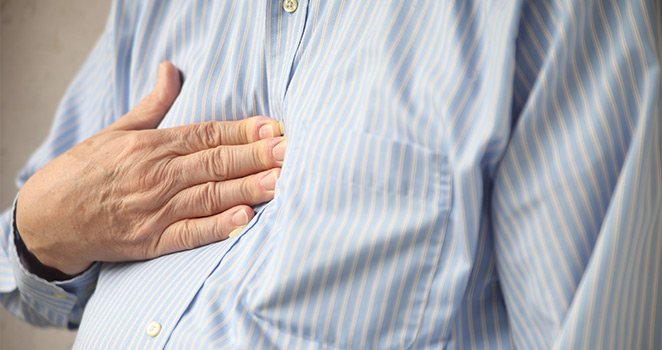Atrium Health Navicent Gastroenterology
Gastroesophageal Reflux Disease (GERD)

Characterized by painful heartburn and acid indigestion, gastroesophageal reflux disease (GERD), affects seven million Americans. A weakening of the sphincter between the lower esophagus and the stomach causes GERD. This loosening allows acid and other stomach contents to flow back up into the esophagus. While GERD is rarely life threatening, the esophagus repeated exposure to stomach acids can damage the esophageal lining. In a few cases, GERD can lead to a condition known as Barrett's Esophagus and increased risk of esophageal cancer.
Symptoms
One of the most common symptoms of this condition is heartburn that increases when lying down, bending over or after eating. Heartburn is often described as a burning pain that travels from the middle of the chest area to the throat. Acid reflux can also affect the throat area. Sufferers often report discomfort when swallowing or a lump-like feeling in their throats. Sometimes, the acid backing up into the esophagus will cause a hoarse voice, sore throat or a sour taste in the mouth. Other GERD symptoms include:
- A persistent cough,
- Nausea,
- Burping
- Vomiting or regurgitating into the mouth,
- Asthma and
- Wheezing
Occasionally, some people experience pain in the chest area too. For many, this discomfort is indistinguishable from heart attack pain. As a result, it's best to seek immediate medical assistance if you experience any chest pain.
Causes
The direct cause of acid reflux disease is the weakening of the lower esophageal sphincter, but there are also other conditions, which can cause breach. Obesity, pregnancy, and Hiatal hernias can lead to reflux disease, and aging can increase your odds of experiencing the condition. Certain foods, especially those with high acid content, can aggravate the esophagus and GERD symptoms. The amount of food you eat and the pace of consumption can affect occurrences of GERD. Some medications can cause a weakening in the lower esophageal sphincter, as can alcohol consumption and smoking.
Anecdotally, some patients report that wearing tight clothing around their midsections and lying or sitting after eating aggravates their symptoms.
Diagnosis
In most cases, patients with GERD are diagnosed by their persistent and troublesome symptoms. Testing is usually performed if symptoms do not improve with treatment or if patients experience troubling symptoms such as internal bleeding, sudden and unexplained weight loss, and inability to swallow. In these infrequent cases, an upper endoscopy will be ordered to see if any damage has occurred to the esophagus' lining.
Treatment
Treatment often depends on the severity and causes of the condition. For very mild cases, symptoms can be alleviated with a change in diet and simple over-the-counter antacids. For those with more persistent cases, a change in diet is augmented with a two-week regimen of H2 blockers or proton-pump inhibitors.
H2 blockers work by disabling the stomach lining's signals to produce acid. Those who take H2 blockers will notice reduced acid reflux symptoms within an hour, but the effects usually last only about 12 hours. Many H2 blockers are available over the counter under the brand names of Tagamet, Zantac, and Pepcid.
Proton-pump inhibitors or PPI's suppress the production of stomach acid, and they are generally considered the more powerful acid reducer. These medications usually take longer to alleviate symptoms, but their effects last for one to three days. Many PPIs are available over the counter, and you might know them by their brand names such as Nexium, Prilosec, and Prevacid. Some physicians may also prescribe the PPI medications to better control the dosage. Some studies show that long-term use of PPIs can lead to other health concerns, though, so talk with your doctor about the best length of treatment for your GERD symptoms.
Lifestyle Changes
Many people report improved symptoms by making a few important lifestyle changes. Limiting alcohol consumption and ceasing to smoke can help reduce symptoms. If you are obese, losing weight also often alleviates acid reflux. At bedtime, propping yourself up on a wedge or rising the head of the bed can also help.
Dietary Changes
What you eat, how you eat, and what you do after you eat also affects GERD symptoms. Reduce meal portion sizes so you are not overeating. Avoid sitting, lying down, or bending over immediately after consuming a meal. Stop eating about three hours before bedtime so stomach acids have a chance to subside.
Pay attention to what you eat and how those foods affect your likelihood of symptoms. Then reduce or eliminate those foods from your diet. Certain foods irritate esophagi that are already aggravated by GERD, these foods often include:
- Citrus fruits and juices
- Carbonated drinks,
- Coffee and tea,
- Tomato-based foods,
- Spicy foods,
- Fatty foods,
- Peppermint and other mints,
- Chocolate and
- Alcohol
While GERD is usually not life threatening, in very few instances, surgery is required to improve the strength of the lower esophageal sphincter. Surgery may also be warranted for those who have developed complications from GERD.